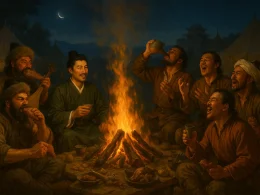Su Wu lived among the Tartar ten years long,
He kept his Han rod strong.
A wild swan flew o’er the Forest Park of the Divine;
Could it bring a message to the Imperial Court in time?
He tended sheep in the northern border, bitter, lone;
His heart was broken, gazing toward the setting sun.
Thirsty, he drank the ice from the moon’s cave;
Hungry, he ate the snow falling from the sky.
The desert stretched endless on his eastward way;
He bade the bridge farewell, sad and drear.
He wept, holding the robe of his friend,
Their tears became blood, seeing the bitter end.
Original Poem:
「苏武」
李白
苏武在匈奴,十年持汉节。
白雁上林飞,空传一书札。
牧羊边地苦,落日归心绝。
渴饮月窟冰,饥餐天上雪。
东还沙塞远,北怆河梁别。
泣把李陵衣,相看泪成血。
Interpretation:
This poem depicts the story of Su Wu, a Han dynasty envoy detained by the Xiongnu, and his steadfast loyalty amidst harsh conditions. In 100 BCE, Su Wu was sent on a diplomatic mission to the Xiongnu but was held captive by the Chanyu. Despite threats and temptations, he remained unyielding. Exiled to Lake Baikal to herd sheep, he endured extreme hardship for nineteen years before finally returning to the Han court. Through its portrayal of Su Wu’s perseverance, endurance, and longing for home, the poem exemplifies his unwavering faith and resilience.
First Couplet: "苏武在匈奴,十年持汉节。"
Sū Wǔ zài Xiōngnú, shí nián chí hàn jié.
Su Wu, held captive among the Xiongnu, For ten years clung firm to the Han envoy’s staff.
The opening lines establish Su Wu’s plight and his unyielding spirit, setting the poem’s solemn and heroic tone.
Second Couplet: "白雁上林飞,空传一书札。"
Bái yàn shànglín fēi, kōng chuán yī shū zhá.
A white goose flies toward the Shanglin Park, But carries only a lone letter back.
After years of captivity, a wild goose becomes Su Wu’s only means of sending word home, highlighting his isolation and the difficulty of communication.
Third Couplet: "牧羊边地苦,落日归心绝。"
Mù yáng biāndì kǔ, luòrì guī xīn jué.
Herding sheep on the bitter frontier, His heart despairs at sunset, yearning for return.
This couplet depicts Su Wu’s harsh living conditions and his despairing homesickness, underscoring his resolve amid adversity.
Fourth Couplet: "渴饮月窟冰,饥餐天上雪。"
Kě yǐn yuè kū bīng, jī cān tiān shàng xuě.
Thirst quenched with ice from the moon’s domain, Hunger relieved by falling snow from the skies.
Vividly portraying Su Wu’s struggle for survival in the northern wilderness, these lines emphasize his extraordinary endurance and loyalty.
Fifth Couplet: "东还沙塞远,北怆河梁别。"
Dōng hái shā sài yuǎn, běi chuàng hé liáng bié.
Heading east, the desert frontier stretches far; Northward, the farewell at the bridge aches with sorrow.
Su Wu finally returns eastward, yet the vast frontier and his parting with Li Ling at the bridge evoke profound grief.
Sixth Couplet: "泣把李陵衣,相看泪成血。"
Qì bǎ Lǐ Líng yī, xiāng kàn lèi chéng xuè.
Clutching Li Ling’s robe, weeping without end, Their eyes meet, tears turning to blood.
The final couplet portrays the poignant farewell between Su Wu and Li Ling—former friends now separated by loyalty and surrender—intensifying the tragedy of their encounter.
Holistic Appreciation
With concise and powerful strokes, this poem recounts Su Wu’s hardships during his detention by the Xiongnu, highlighting his unwavering integrity. It begins with his steadfast holding of the Han envoy’s staff, moves through his struggles and longing for home, and culminates in his tearful farewell with Li Ling. Each stanza deepens the emotional intensity, building toward a climactic expression of grief and loyalty. The contrast between Su Wu’s loyalty and Li Ling’s surrender underscores the poem’s thematic depth, celebrating the moral fortitude of a true patriot.
Artistic Merits
- Layered Progression, Emotional Depth: The poem evolves from loyalty and hardship to parting, intensifying in emotional resonance.
- Vivid Contrast, Profound Meaning: The juxtaposition of Su Wu’s faithfulness and Li Ling’s submission accentuates the poem’s moral gravity.
- Concise Language, Evocative Imagery: Lines like “Thirst quenched with ice…” use extreme conditions to emphasize resilience, creating a vivid and solemn atmosphere.
Insights
This poem extols Su Wu’s unyielding spirit and deep sense of duty, demonstrating how he maintained his integrity under extreme duress. The contrast between Su Wu and Li Ling invites reflection on ethical choices, reminding us to uphold justice and remain true to our convictions in the face of temptation or adversity. Su Wu’s eventual return to Han also signifies that steadfast faith ultimately prevails, offering inspiration and courage to those facing hardship.
About the poet

Li Bai (李白), 701 - 762 A.D., whose ancestral home was in Gansu, was preceded by Li Guang, a general of the Han Dynasty. Tang poetry is one of the brightest constellations in the history of Chinese literature, and one of the brightest stars is Li Bai.












